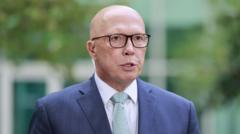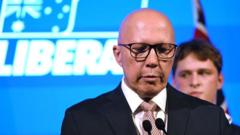In a significant policy reversal, Peter Dutton has abandoned his coalition’s plan to end remote work for public servants, after critics raised concerns about its impact on women. The opposition leader acknowledged the error, stating that flexible working conditions are vital for workforce efficiency.
Australian Opposition Leader Retracts Plan to Ban Remote Work for Public Servants

Australian Opposition Leader Retracts Plan to Ban Remote Work for Public Servants
Peter Dutton, Australia’s opposition leader, apologizes for a controversial policy that aimed to eliminate work-from-home options for public employees following public backlash.
In an unexpected turn of events, Peter Dutton, the Australian opposition leader, has backtracked on an election promise to eliminate work-from-home arrangements for public servants. Facing intense backlash, Dutton conceded that the Liberal-National Coalition's stance was misguided and publicly apologized during a press conference on Monday.
Australians are facing an upcoming election slated for May 3, and the coalition had initially pitched the controversial policy alongside plans for substantial cuts to public service jobs, as a measure to enhance operational efficiency within the government. However, opposition from various groups, particularly the incumbent Labor government, highlighted that dismantling work-from-home options would notably disadvantage working women.
"We got it wrong and we have apologized for it," Dutton remarked, stating that the initial policy had been intended to target only public service workers in Canberra. He contended that the Labor party had misrepresented the proposal in an attempt to tarnish his coalition's reputation.
Shadow finance minister Jane Hume echoed this sentiment, declaring that there would now be no changes to flexible working arrangements, insisting, "We have listened and understand that flexible work, including work from home, is part of getting the best out of any workforce."
In addition to the changes regarding remote work, the Coalition further clarified its proposal to reduce 41,000 public service jobs to meet its financial promises. While there has been demand for specifics on where these cuts will occur, Hume stressed that the party, if victorious, would focus on achieving the reduction over a five-year plan via hiring freezes and natural attrition.
Contradicting Hume's remarks, Dutton admitted, "we got the policy wrong in that regard," seeking to rectify the coalition's course.
The Labor government seized on Dutton's policy reversal, branding him as inconsistent in his statements. Employment Minister Murray Watt criticized Dutton’s attempt to reshape his image, declaring that while he may change his words, he cannot alter the public's perception of his identity.
The gathering backlash against stringent workplace policies is echoed globally, with examples like US President Donald Trump mandating federal employees to return to office full-time, and corporate giants like Amazon insisting on full-time in-office work. However, in Australia, public sentiment is largely reflected in concerns over rising living costs, which are now superseding debates on workplace flexibility.



















